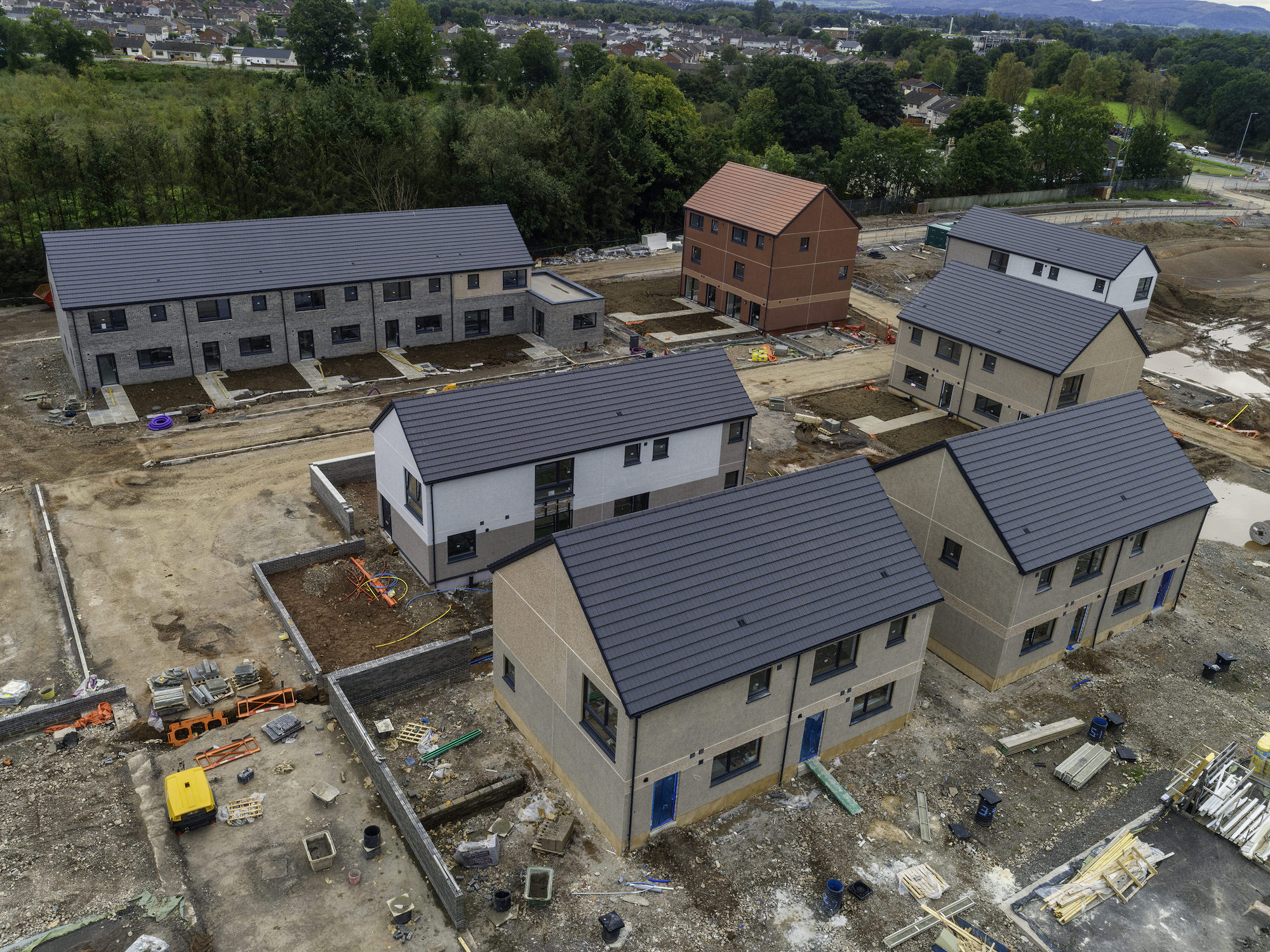New home starts falls by 24% to reach lowest level since 2014

The number of new homes started in Scotland over 12 months has fallen by 24% compared to the previous year to reach the lowest annual figure for almost ten years.
Quarterly statistics on housebuilding and affordable housing supply published today by Scotland’s Chief Statistician revealed that there were only 16,274 new build homes started in the year to the end of September 2023, a reduction of 5,260 homes from the 21,534 starts in the previous year, and the lowest annual figure to end September since 2014.
Private-led new build starts decreased by 19% (3,017 homes), housing association new build starts decreased by 34% (1,099 homes) and local authority new build starts decreased by 50% (1,144 homes).
All-sector new build home completions over the same period reached 21,952, a decrease of 6% (1,355 homes) on the 23,307 completions in the previous year.
Decreases were seen in private-led new build completions (3% or 491 homes) and local authority new builds by 44% (or 1,241 homes) whilst housing association new build completions increased (9% or 377 homes).
Separate quarterly statistics on the Affordable Housing Supply programme show there were a total of 2,351 affordable homes completed in the latest quarter July to September 2023. This brings the total number of affordable homes completed in the 12 months to the end of September 2023 to 10,582, an increase of 9% (877 homes) on the 9,705 homes completed in the previous year, and the highest annual year to date completions figure since the start of the series in 2000.
There was a decrease in the number of affordable homes completed for social rent by 2% (196 homes) whilst increases in other affordable rent by 47% (481 homes), and affordable home ownership completions by 80% (592 homes).
Meanwhile, there were 1,153 affordable homes approved in the latest quarter July to September 2023, which brings the total number of affordable homes approved in the 12 months to the end of September 2023 to 6,178, a decrease of 14% (981 homes) on the 7,159 homes approved in the previous year, and the lowest annual figure to end September since 2013. There were decreases in the latest year to the end of September 2023 in the number of approvals for social rent (by 18%, or 985 homes) and for other affordable rent (by 37%, or 320 homes), although approvals for affordable home ownership increased by 46% (324 homes).
There were 1,341 affordable homes started in the latest quarter July to September 2023, which brings the total number of affordable homes started in the 12 months to end September 2023 to 6,302. This was a decrease of 24% (1,996 homes) on the 8,298 started in the previous year, and the lowest annual figure to end September since 2015. There was a decrease in the latest year to the end of September 2023 in the number of starts for social rent (by 29%, or 1,947 homes) and other affordable rent (by 40% or 377 homes), although affordable home ownership increased (by 45% or 328 homes).
According to data from council tax returns, there were 46,217 long-term empty properties as of September 2023, which is an increase of 4% (1,616 properties) from the 44,601 properties in 2022. Across the same time period, the number of second homes has decreased by 1% (226 homes) from 24,287 to 24,061.
Housing minister Paul Mclennan said: “I am pleased that the number of affordable homes completed in the latest year is the highest annual figure since 2000, supporting just over 10,500 households to have an affordable place to live.
“The combined challenges caused by a hard Brexit and economic mismanagement by the UK Government have triggered various issues including the rising cost of construction supplies and workforce challenges.
“This has undoubtedly impacted on the number of new build homes started over the last year.
“Despite these challenges, the housing sector has done incredible work to deliver homes and we will continue working with partners to mitigate these impacts.
“We are also making £3.5 billion available in this parliamentary term, towards the delivery of more affordable and social homes.
“Despite the challenges facing the housing sector, we have already delivered 15,765 homes towards our next target of 110,000 affordable homes in Scotland by 2032.”
As the figures were released, First Minister Humza Yousaf has been warned his ‘defining mission’ to tackle poverty is at risk if finance is not provided to in crease the number of new social homes.
In an open letter, the Scottish Federation of Housing Associations (SFHA) and the Poverty Alliance, alongside major social justice organisations, outline evidence that building social homes is a key part of lowering child poverty rates. They call on the Scottish Government to address the £700 million that has been eroded from the Affordable Housing Supply Programme (AHSP) due to inflation, as part of next week’s Scottish budget.
A recent Freedom of Information request found that the Scottish Government’s own risk register for the Affordable Housing Supply Programme showed substantial concerns about the ability to deliver the government’s target of 110,000 affordable homes by 2032, 70% of which to be social rents.
Sally Thomas, SFHA CEO, said: “Delivering the social homes we need is central to the Scottish Government’s guiding mission of ending the injustice of poverty.
“We know that up to 20,000 children across Scotland are kept out of poverty because of social housing, but with a further 10,000 children stuck in the insecurity of temporary accommodation and the devastating effects that has on their wellbeing and life chances, it is more than urgent that the Scottish Government begins to address the £700m funding gap in the Affordable Housing Supply Programme.
“The Scottish Government’s current target of delivering 110,000 affordable homes by 2032 is not just stalling, but is in reverse. Failing to increase the Affordable Housing Supply Programme will not only see this target become an impossible dream, but it will plunge households across the country further into poverty.”
The calls for a £700m increase to the AHSP were echoed by the Poverty Alliance who said that this month’s budget represented an opportunity for the Scottish Government to increase its investment in social housing and lift thousands of children out of poverty.
Peter Kelly, director of The Poverty Alliance, said: “Having a safe, secure, warm home is one of our most basic needs. It lays the foundation for many other human needs to be met. But Scotland is facing a housing emergency.
“If urgent action isn’t taken, it will make it much more difficult for Scotland to meet its child poverty targets, and to give people the freedom and stability they need to build a life beyond the injustice of poverty.
“The Scottish Government can invest in a fairer future, and fund the social homes that people so desperately need.”
Shelter Scotland claimed the Scottish Government has no plan to arrest the continued decline in social housing delivery.
Director Alison Watson said: “The alarming decline in the delivery of social homes shown in today’s figures reflects Scottish Government choices.
“Ministers can’t claim to be ignorant of what this means; it means that an already devastating housing emergency will get worse and continue to devastate lives.
“Local housing officers, charities, and the experts in its own working groups have repeatedly and clearly told the Scottish Government that more social homes are needed to effectively fight the housing emergency and reduce the numbers of people trapped in temporary accommodation, but their words have gone unheeded.
“Scottish Government choices made the decline shown in today’s figures grimly predictable.
“Unless we see something different in next week’s budget the only possible conclusion we can reach is that the Scottish Government has no serious plan to tackle homelessness and end the housing emergency.”
Sector body Homes for Scotland (HFS) said the statistics show Scotland’s housing crisis intensifying.
Chief executive Jane Wood said: “The downward trend in housing starts has now been sustained across three years and clearly evidences the growing challenge for those in need of a home that meets their requirements.
“With today’s housing starts representing future completions, the figures starkly illustrate that the housing inequality being experienced across the country will become even more acute.
“If the numbers tell us anything it is that the policy environment that surrounds the delivery of new homes requires urgent evidence-based reassessment. Private investment must be actively encouraged and welcomed with the recognition that this goes hand in hand with Affordable Housing objectives.”









